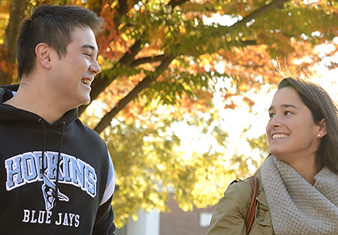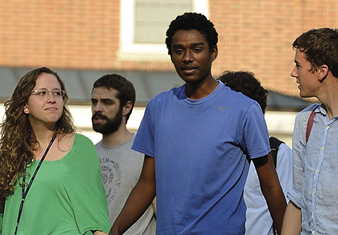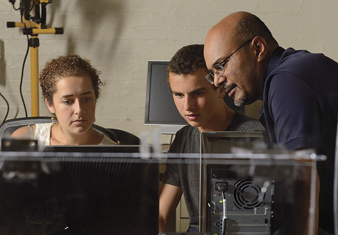
Fostering Inclusive Excellence
Cultivating a diverse community with improved supports and open dialogue.
Johns Hopkins aims to cultivate a community where every member feels a full sense of belonging, regardless of race, gender, religion, sexual orientation, socioeconomic status, or political viewpoint. Building that sense of inclusion takes many forms, from improving the diversity of our community to facilitating candid conversations that confront barriers to opportunity. We are pursuing a number of initiatives focused on building a stronger climate and community.
- Greater diversity in undergraduate admissions. The Class of 2020 is the most diverse to date, with 23 percent of the enrolled class identifying as members of underrepresented minorities.
- Training. During new student orientation, the university offers diversity-focused training and education initiatives for undergraduates, including a large lecture on diversity and inclusion followed by small-group discussions. The university also provides a variety of targeted sessions, like cultural competency training for RAs and peer mentors, unconscious bias training (including for search committees), and discrimination and harassment prevention training for faculty and staff.
- Standing with the LGBTQ community. In July 2015, about 150 people representing Johns Hopkins University, Johns Hopkins Medicine, and Applied Physics Laboratory — including several who teamed up to create a colorful “scrubs rainbow” — took part in Baltimore’s 40th annual LGBTQ Pride parade. In 2016, the Hopkins contingent doubled to more than 300 people. After the June 2016 mass shooting in an Orlando nightclub, the university lighted the university gateway on Charles Street with the colors of the pride flag, and rainbow flags were also displayed on the East Baltimore campus and at several Johns Hopkins Medicine affiliates, signifying solidarity with the LGBTQ community.
- An open conversation about race. The JHU Forums on Race in America were launched in spring 2015 amid turmoil in several U.S. cities, including Baltimore. Since then, the forums have brought several prominent speakers to the Homewood campus for conversations around issues that have included justice reform, economic equality, and grassroots organizing. In October 2016, more than 400 Johns Hopkins students, faculty, and staff linked arms in an unbroken chain along Charles Street on the edge of the Homewood campus in support of the Black Lives Matter Movement.



